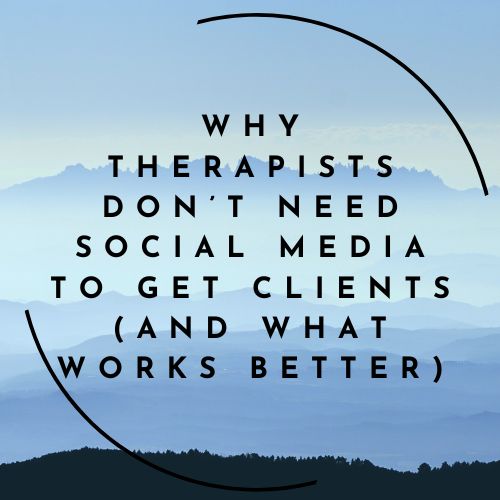Does a Therapist Really Need Social Media to Grow a Private Practice?
If you’re a therapist trying to grow your practice, you’ve likely been told “You HAVE to be on social media.” Maybe you’ve even spent hours crafting Instagram posts, filming TikToks, or sharing insights on LinkedIn—only to see minimal engagement and no real increase in client inquiries.
Here’s the truth: Therapists don’t need social media to attract clients.
While social media can be helpful for educating and networking, it’s often a poor strategy for actually bringing in paying clients. Many therapists feel burnt out by the constant pressure to create content, only to realize that their ideal clients aren’t even looking for therapy on social media in the first place.
So, if social media isn’t the best strategy, what actually works? Let’s break down why social media isn’t necessary for therapists and what proven alternatives will bring you more clients with less effort.
Learn More About My Writing Services for Therapists
1. Clients Use Google to Find Therapists – Not Instagram or TikTok
When someone realizes they need therapy, what’s the first thing they do?
- They don’t scroll Instagram looking for a therapist.
- They don’t watch TikToks hoping to find the right person.
- They go to Google and type things like:
✅ “Trauma therapist near me”
✅ “How do I find a therapist for anxiety?”
✅ “Best therapists in [your city]”
💡 What This Means for You:
Instead of spending hours on social media, focus on SEO (Search Engine Optimization) so that your website ranks high in Google searches. This ensures that when someone is actively looking for a therapist, they find you.
✅ Better Strategy: Optimize your therapy website so it appears on Google’s first page when clients search for therapists in your area.
2. Social Media Favors Short Content—Therapy Requires Depth
Social media thrives on quick, bite-sized content—but therapy is about depth, trust, and emotional safety.
🚫 The Problem with Social Media:
- Instagram posts get buried within hours.
- TikToks prioritize entertainment, not deep engagement.
- Facebook rewards trending topics, not long-term connections.
✔ Better Alternative: Write high-quality, client-focused blog posts on your website. Blog posts are searchable for months or even years, bringing in steady traffic and new inquiries over time.
💡 Example Blog Topics That Outperform Social Media Posts:
✅ “How to Know If You Need Therapy (And What to Expect in Your First Session)”
✅ “What’s the Difference Between CBT and EMDR?”
✅ “5 Strategies to Manage Anxiety Between Therapy Sessions”
By writing blog content that answers common client questions, you position yourself as an expert AND attract clients without needing to chase social media engagement.
3. Social Media Marketing is Time-Consuming and Unpredictable
If you’ve ever spent hours planning content, only to get a few likes and zero inquiries, you already know:
🚫 Social media is an exhausting full-time job that requires:
✔ Constant posting to stay relevant
✔ Daily engagement (liking, commenting, responding to DMs)
✔ Keeping up with ever-changing algorithms
Compare that to SEO and blogging, which:
✔ Work for you 24/7—even when you’re not actively posting
✔ Require minimal upkeep once optimized
✔ Attract high-quality leads for months or years
💡 Better Strategy: Instead of wasting hours on social media, invest that time into:
✅ SEO-optimized website pages (so your services appear in Google searches)
✅ Long-form blog content (that answers client questions and builds trust)
✅ A well-written therapist bio and services page (so visitors feel confident booking a session)
4. Your Ideal Clients May Not Even Be on Social Media
Think about the clients you want to work with. Are they:
- Burned out professionals with no time for Instagram?
- Older adults who prefer Google searches over TikTok?
- People struggling with mental health who avoid social media to protect their well-being?
Many therapy clients either don’t use social media frequently OR don’t engage with therapy-related content there.Instead, they:
✔ Search for therapists on Google or Psychology Today
✔ Ask friends, family, or doctors for referrals
✔ Browse therapist blogs and websites to find someone they trust
💡 Better Strategy: Focus on where your ideal clients actually look for therapy—Google searches, Psychology Today, and your website.
5. Ethical & Privacy Considerations Make Social Media Tricky for Therapists
Unlike other professionals, therapists must navigate strict ethical and privacy guidelines. Social media blurs professional boundaries, making it difficult to:
🚫 Maintain client confidentiality
🚫 Avoid dual relationships
🚫 Stay compliant with HIPAA and ethical codes
Additionally, potential clients may hesitate to engage with a therapist’s social media content due to privacy concerns. They’re more likely to research therapy privately and reach out via a secure, professional channel.
💡 Better Strategy:
✅ Keep your marketing efforts professional and ethical by focusing on your website, blog, and search visibilityinstead of public-facing social media.
What Works Better Than Social Media for Therapist Marketing?
Instead of pouring energy into social media, invest in proven strategies that bring in consistent, high-quality therapy clients:
✔ SEO (Search Engine Optimization) – So clients searching for therapy on Google find your website first.
✔ Well-Written Website Copy – So visitors feel seen, understood, and ready to book a session.
✔ Professional Blog Writing – So you educate and attract the right clients.
✔ Psychology Today & Directories – So clients can easily contact you through trusted platforms.
By shifting your focus to sustainable, long-term marketing strategies, you free yourself from the content treadmill of social media and create a practice that attracts clients effortlessly.
Want Help Marketing Your Practice Without Social Media?
How My SEO-Optimized Content Writing Helps Therapists Grow Their Practice
Many therapists struggle with getting found online and turning website visitors into paying clients. Your therapy website should work for you, 24/7, bringing in a steady stream of potential clients—without the need for constant social media posting or paid ads. That’s where I come in.
I specialize in SEO-optimized content writing for therapists, helping private practices attract the right clients while maintaining an ethical, professional, and approachable online presence. Here’s how my writing can transform your practice:
✅ Rank Higher on Google (So Clients Find You First)
When someone searches “anxiety therapist near me” or “how to know if I need therapy”, your website should be one of the first results they see. But without strategic, well-written content, your website can get buried beneath competitors.
I use evidence-based SEO strategies to:
✔ Optimize your website pages (Home, About, Services) with high-ranking keywords and client-centered language
✔ Write high-quality blog posts that answer client questions and improve your Google rankings over time
✔ Enhance your metadata, internal links, and structure so search engines recognize your site as authoritative
🚀 Result: Your website moves up in Google search results, attracting more organic traffic and getting you in front of clients actively searching for therapy.
✅ Attract the Right Clients Without Social Media
Not all website visitors are the right fit for your practice—and that’s okay. The goal is to attract clients who align with your expertise and approach, not just random clicks.
How do I do this?
✔ Targeted messaging: I ensure your website speaks directly to your ideal client’s needs and struggles.
✔ Specialty-focused content: Whether you focus on trauma therapy, EMDR, couples counseling, or mindfulness-based therapy, I tailor content to highlight your expertise.
✔ Clear, engaging descriptions: Your services are written in a way that resonates with clients, not just in clinical jargon.
🚀 Result: Your website attracts clients who genuinely need and want your services, rather than people casually browsing.
✅ Convert Website Visitors Into Inquiries & Booked Sessions
Getting traffic to your website isn’t enough—the real goal is to turn visitors into paying clients. Many therapists struggle because their website lacks clear calls to action or feels too clinical and impersonal.
I make sure your website is designed to convert by:
✔ Writing strong, client-centered calls to action (CTAs) that encourage visitors to book a session or reach out.
✔ Structuring your pages for easy navigation, so visitors can quickly find the information they need.
✔ Creating an inviting, warm tone that reassures clients they’re in the right place.
🚀 Result: More visitors contact you for consultations, book sessions, and trust your expertise—leading to a more successful, sustainable practice.
Are You Ready to Get More Clients Without Social Media Burnout?
If you’re tired of struggling with low website traffic, inconsistent inquiries, or ineffective marketing, I can help. My SEO-driven, psychology-informed writing ensures that your website works for you—attracting, engaging, and converting clients without the stress of social media marketing.
Learn More About My Writing Services for Therapists
Related Resources:

